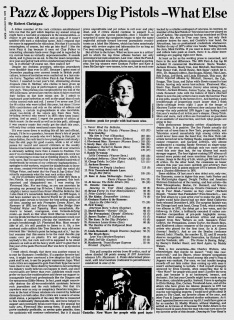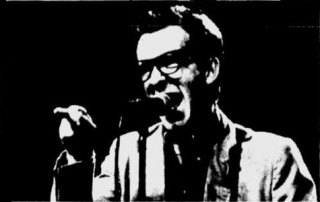Village Voice, January 23, 1978: Difference between revisions
(add transcribed text) |
|||
| Line 4: | Line 4: | ||
{{:Magazine index}} | {{:Magazine index}} | ||
{{Bibliography article header}} | {{Bibliography article header}} | ||
<center | <center>The 1977 Pazz & Jop Critics Poll</center> | ||
<center><h3>Pazz & Joppers Dig Pistols - What Else Is New?</h3> </center> | |||
---- | ---- | ||
<center> | <center> Robert Christgau </center> | ||
---- | ---- | ||
{{Bibliography text}} | |||
A fellow member of the rock criticism establishment tells me that the poll which inspires my annual wrap-up might have a real shot at exposure in the newsweeklies—a chance to get me AM airplay and go pop—if it wasn’t saddled with such a ridiculous name. And I respond that the name is supposed to be ridiculous. Not that it’s actually meaningless, of course, but why go into that? I like the term Pazz & Jop because it once set Clay Felker to concocting alternate back-cover flags and is regarded by my current boss as virtually unpronounceable. It sounds dumb, and it gives me an out. Is this the most comprehensive year-end poll of rock critics conducted anywhere? You bet. Is it official? Of course not. How could it be? | |||
Despite my feckless promises, selection procedures were shoddier than ever in 1977. Because I spent most of December puzzling over current trends in British youth culture, letters of invitation were mailed out in a last-minute flurry. Together with fellow Pazz & Jop Poobah Ken Tucker. I resorted to last year’s list, eliminating obvious dropouts (like R. Meltzer, who claims to have given up criticism for the joys of performance) and adding a few new guys. This process was complicated by my loss of the 1976 addresses; several late entries claim to have received their ballots on due date minus one. So I admit to haphazard panel selection as well as the usual bias of rock critics toward rock and roll. I swear I’ve never met 25 of the 68 critics who were tallied this year, but since I favor Riffs contributors and rely on the advice of editors and publicists, a certain in-groupishness is also inevitable. About two-thirds of the voters are from New, York, including several who weren’t in 1976—they keep immigrating. And as usual, I regret the paucity of critics of black music (in the world as well as in this poll), although it was country music that really got the shaft this year, | |||
with only four artists mentioned more than once. | |||
If it ever came down to making this all fair and official, though, I’d be in a quandary, because there’s lots of people, who write about records who don’t belong In this poll. At many dailies, the rock beat is less prestigious (and steady) than the obit page for good reason, while a lot of what passes for record and concert criticism at the weekly leisure-time handouts now running amok all over America | |||
is obviously nothing more than a means to freebies. I’m sure I’ve overlooked dozens of serious people who work not only at listening to music but at thinking about it, which is even rarer. But I’m sure too that I’ve excluded hundreds of dunderheads by means of my arbitrary haphazardness. I apologize to the workers, request the dunderheads to leave me alone, remind everyone that this is still the weird old Village Voice, and insist that the Pazz & Jop Critics’ Poll actually represents what the best rock critics think. | |||
As you’ve probably gathered already, what they think is Sex PistoIs. As you probably haven’t guessed, this both surprised and disappointed me. I was rooting for Fleetwood Mac. For one thing, as you can ascertain by perusing my personal top 30 below, I think Rumours is a (slightly) better record than Never Mind the Bollocks. But I also think it’s remarkable historically. As 1978 began, it | |||
had been number one In Record World for 32 weeks and seemed quite certain to become the best-selling album of all time, passing not only Frampton Comes Alive!, the Rumours of 1976, but all-time biggies like Bridge Over Troubled Water and Tapestry. More remarkable, Rumours is honest, courageous, even formula-defying music—so much so that when Greil Marcus reviewed it here he predicted that its toughness and passion would cost it millions of consumers craving the sweetness of the group’s breakthrough LP, Fleetwood Mac. Most remarkable of all, it’s still possible to listen to it. Oh, a few sorehead radio addicts like Tom Smucker may add some comment like “docked a point for being sick of it,” but the fact remains that this seems to be the most durable pop music ever put on plastic. It’s not going to change anybody’s life, but rock and roll is supposed to be about pleasure as well as all the heavy stuff, and I’m glad that in this year of the punk Fleetwood Mac was here to remind us of that. | |||
I must admit, though. that there was another reason to to root for Rumours: credibility. If a popular favorite had won, It might have convinced a few skeptics that all this punk stuff is not, to use the popular expression, hype. What rock critics are supposed to gain from their hype has never been clear to me: Since death by boredom is not something the industry really believes can happen to itself, and since record sales are better than ever, publicists would much prefer we bury the troublemakers and throw our support to manageable hard-rock professionals like the Dingoes and the eponymous [[Eddie Money]]. In fact, punk might conceivably destroy the all too comfortable symbiosis between rock journalism and the rock industry. Not that it’s anywhere near as cozy as conspiracy theorists imagine— even in the best of times relations are marred by habitual disrespect on both sides. But critics are a source of some small status, a perquisite of the easy life that is treasured in this traditionally disreputable biz, and have helped to support and eventually break more than a few unusual but tasty acts, Fleetwood Mac among them. If punk should prove modestly profitable, as seems quite possible, then the symbiosis will continue undisturbed. But it if should | |||
''Remainder of text to follow'' | |||
| Line 40: | Line 56: | ||
29. Mink DeVille: Mink DeVille <br> | 29. Mink DeVille: Mink DeVille <br> | ||
30. Kraftwerk: Trans-Europe Express <br> | 30. Kraftwerk: Trans-Europe Express <br> | ||
{{cx}} | |||
{{Bibliography notes header}} | {{Bibliography notes header}} | ||
Revision as of 13:29, 18 March 2015
|


